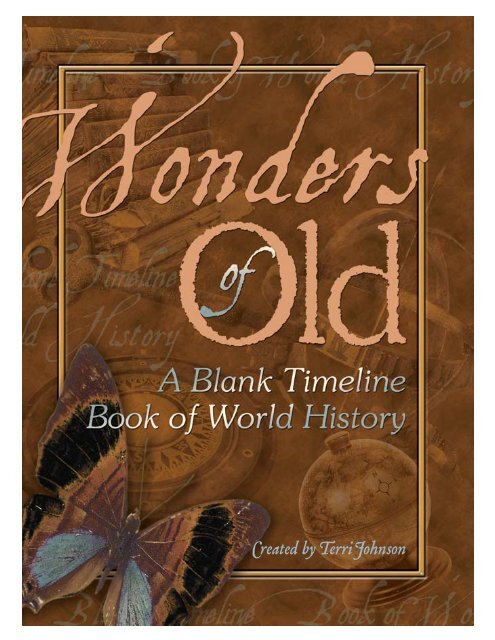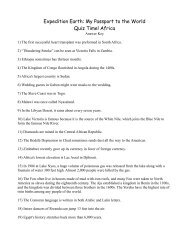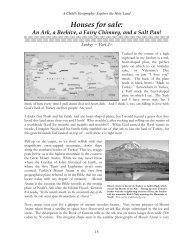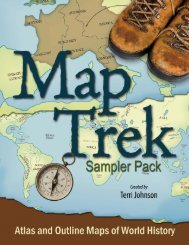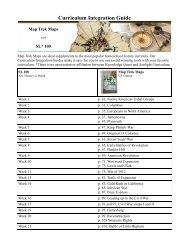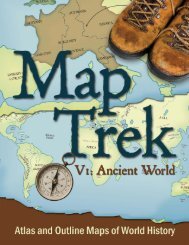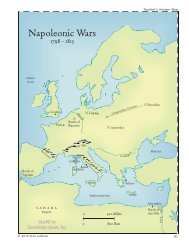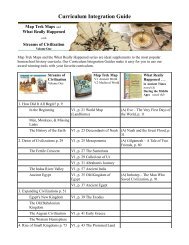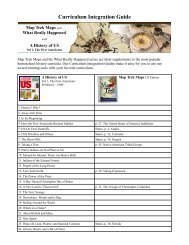Created by Terri Johnson - Knowledge Quest
Created by Terri Johnson - Knowledge Quest
Created by Terri Johnson - Knowledge Quest
You also want an ePaper? Increase the reach of your titles
YUMPU automatically turns print PDFs into web optimized ePapers that Google loves.
<strong>Created</strong> <strong>by</strong> <strong>Terri</strong> <strong>Johnson</strong>
History Comes Alive...<br />
When your student records signifi cant historical events in his own hand. This blank timeline book with<br />
dates pre-marked from 5000BC to the present will allow your student to gain a better understanding<br />
of the fl ow of history.<br />
He will make connections between historical events <strong>by</strong> recording entries across academic subjects...<br />
∗ kingdoms<br />
∗ empires<br />
∗ rulers<br />
∗ scientists<br />
∗ literature<br />
∗ great writers<br />
∗ musicians<br />
∗ and so much more!<br />
...all can be recorded into his own personal book of history. Wonders of Old is divided into four<br />
historical time periods: ancient, medieval, new world and modern. Signifi cant dates are listed at the<br />
conclusion of each section as a helpful reference.<br />
Hooray!<strong>Knowledge</strong> <strong>Quest</strong>’s latest offering fi lls yet another gap in the resources currently available<br />
to parents and teachers who seek to help their students make connections between key events as they<br />
trace the quiet sovereignty of God in history.Wonders of Old offers a paper-based alternative to wall<br />
or computer timeline versions that is well-planned, attractive and affordable! The student that does<br />
careful and consistent work in this volume will have an informative, enduring keepsake to which he can<br />
refer in years to come.<br />
Marcia Somerville, author of Tapestry of Grace<br />
Maps and Wall Timelines also available from <strong>Knowledge</strong> <strong>Quest</strong>.<br />
Be sure to visit us online at: www.<strong>Knowledge</strong><strong>Quest</strong>Maps.com
Wonders<br />
of Old<br />
A Blank Timeline Book of World History<br />
<strong>Created</strong> <strong>by</strong> <strong>Terri</strong> <strong>Johnson</strong><br />
An Oregon Corporation
Wonders of Old<br />
A Blank Timeline Book of World History<br />
<strong>Created</strong> <strong>by</strong> <strong>Terri</strong> <strong>Johnson</strong><br />
Published <strong>by</strong>: Bramley Books, a division of<br />
<strong>Knowledge</strong> <strong>Quest</strong>, Inc.<br />
Post Office Box 789<br />
Boring, OR 97009-0789<br />
All rights reserved. No part of this book may be reproduced or<br />
transmitted in any form or <strong>by</strong> any means, electronic or mechanical,<br />
including photocopying, recording or <strong>by</strong> any information storage<br />
and retrieval system without written permission from the author,<br />
except for the inclusion of brief quotations in a review.<br />
Copyright © 2004 <strong>Knowledge</strong> <strong>Quest</strong><br />
Revised 2007 <strong>Knowledge</strong> <strong>Quest</strong>, Inc.<br />
<strong>by</strong> <strong>Terri</strong> <strong>Johnson</strong><br />
www.<strong>Knowledge</strong><strong>Quest</strong>Maps.com<br />
www.BramleyBooks.com<br />
Printed in the United States of America<br />
ISBN 978-1-932786-31-6 (ebook edition)<br />
Cover design <strong>by</strong> Cathi Stevenson, Nova Scotia<br />
Page 4
Table of Contents <br />
Introduction to parents and teachers ...............................................................6<br />
Introduction to students ...................................................................................7<br />
Timeline of Ancient History ...........................................................................9<br />
Significant dates of ancient history ...............................................................39<br />
Timeline of Medieval History .......................................................................43<br />
Significant dates of medieval history ............................................................57<br />
Timeline of New World History....................................................................61<br />
Significant dates of new world history ..........................................................72<br />
Timeline of Modern History .........................................................................75<br />
Significant dates of modern history ..............................................................96<br />
My notes (blank sheets) ..............................................................................100<br />
Ordering information ..................................................................................104<br />
Page 5
Introduction for Parents and Teachers <br />
Dear Educator,<br />
As you know, history is a fascinating series of interconnected events. It is amazing how seemingly<br />
unrelated happenings tie into one another. Why, for example, was the United States able to buy<br />
the Louisiana Purchase for only 2¢ an acre? Napoleon would never have sold this valuable land so<br />
cheaply unless he was desperate to fund his war efforts in western Europe. And, of course, this purchase<br />
was the catalyst for Lewis and Clark’s famous exploration. We make these connections with<br />
the help of a timeline, whether it be mental or physical. As these events become congested on our<br />
timeline, we can then begin to look for the relationships between them.<br />
This is a type of thinking we want our middle grade students to develop and our older students to<br />
fine-tune. As our children reach fifth or sixth grade (age 10-12), they begin to reason in a more logical<br />
manner. They learn to argue more effectively and think more logically. Yet this thinking needs<br />
to be carefully cultivated, not left to its own to sprout at will.<br />
The resource of this timeline book will give your student(s) a valuable tool in making logical connections<br />
in history. Encourage him to mark significant dates/events/people from all subjects areas<br />
into his book when he encounters them in his studies. The more he records, the more connections he<br />
will make. And be careful not to draw the conclusions for him, but rather ask leading questions and<br />
allow him to have that “Ah ha!” moment of revelation that brings such satisfaction.<br />
We, at <strong>Knowledge</strong> <strong>Quest</strong>, wish you every success in your teaching endeavors.<br />
Blessings to you on your educational journey,<br />
<strong>Terri</strong> <strong>Johnson</strong><br />
Page 6
Introduction for Students <br />
Dear young historian,<br />
You hold in your hand a blank timeline book for you to fill in <strong>by</strong> recording the events of history.<br />
What is the point, you ask? Well, let’s see...<br />
What was significant about the year 1453AD? This was the year that Constantinople fell to the Ottoman<br />
Turks, the end of the Hundred Years’ War between Britain and France, and the time of production<br />
on the Gutenberg Bible, the first printed book. These events are seemingly unrelated and yet the<br />
use of a timeline can unlock the mystery of why all of these events occurred within the same year.<br />
A timeline will give you a unique perspective of time. By seeing the events of history recorded in<br />
a linear progression, you will make connections between those events in history that you might not<br />
otherwise make as you study them separately.<br />
A timeline will not provide you with the answers, but it will stir your curiousity and lead you to researching<br />
and discovering the answers yourself. This is what makes history fascinating.<br />
To get the most out of this timeline tool, I would ask you to record historical events and people as<br />
you study them. Be sure to include scientists and their discoveries, inventions, famous artists and<br />
writers, virtually anything that occurred in times past. There is a list of significant events provided<br />
for you following each section of your timeline book, but this is just the tip of the iceberg. There is<br />
so much to learn and study. Don’t let the list limit your entries.<br />
If you choose to color code your entries, use this section below to choose and stay consistent with<br />
colors. By the way, gel pens or sharp colored pencils work well for writing with color. And always<br />
use your best handwriting. This may become a cherished keepsake from your school years.<br />
Wishing you all the best,<br />
<strong>Terri</strong> <strong>Johnson</strong><br />
War/Conflict Kings/Rulers Laws/Ruling<br />
Literature Exploration Science<br />
Music Art Inventions<br />
The Bible The Church Medicine<br />
Architecture<br />
Nations/<br />
Empires<br />
Religious<br />
Leaders<br />
Page 7
“I will remember the works of the LORD: surely I<br />
will remember thy wonders of old. I will meditate<br />
also on all thy work, and talk of thy doings.”<br />
...from the Old Testament, the book of Psalms, KJV,<br />
written primarily <strong>by</strong> King David of Israel c.1000BC<br />
Page 8
Timeline of<br />
Ancient History<br />
5000BC - 400AD
The Ancients<br />
Before 9000BC<br />
9000BC<br />
Page 10
5000BC<br />
4900BC<br />
Page 11
The Ancients<br />
4800BC<br />
4700BC<br />
Page 12
4600BC<br />
4500BC<br />
Page 13
The Ancients<br />
4400BC<br />
4300BC<br />
Page 14
4200BC<br />
4100BC<br />
Page 15
The Ancients<br />
4000BC<br />
3900BC<br />
Page 16
3800BC<br />
3700BC<br />
Page 17
The Ancients<br />
3600BC<br />
3500BC<br />
Page 18
3400BC<br />
3300BC<br />
Page 19
The Ancients<br />
3200BC<br />
3100BC<br />
Page 20
3000BC<br />
2900BC<br />
Page 21
The Ancients<br />
2800BC<br />
2700BC<br />
Page 22
2600BC<br />
2500BC<br />
Page 23
The Ancients<br />
2400BC<br />
2300BC<br />
Page 24
2200BC<br />
2100BC<br />
Page 25
The Ancients<br />
2000BC<br />
1900BC<br />
Page 26
1800BC<br />
1700BC<br />
Page 27
The Ancients<br />
1600BC<br />
1500BC<br />
Page 28
1400BC<br />
1300BC<br />
Page 29
The Ancients<br />
1200BC<br />
1100BC<br />
Page 30
1000BC<br />
900BC<br />
Page 31
The Ancients<br />
800BC<br />
700BC<br />
Page 32
600BC<br />
500BC<br />
Page 33
The Ancients<br />
400BC<br />
300BC<br />
Page 34
200BC<br />
100BC<br />
Page 35
The Ancients<br />
1 100AD<br />
Page 36
200AD<br />
300AD<br />
Page 37
The Ancients<br />
400AD<br />
Page 38
Significant Dates* to Consider for the Ancient Time Period:<br />
5000* BC Farming begins in the fertile crescent<br />
5000 BC Farming begins in the Nile valley<br />
5000 BC Jericho grows into a wealthy town<br />
5000 BC Catal Huyuk is at its largest<br />
4500 BC First farmers in western Europe<br />
4300 BC First megaliths built in Brittany and Ireland<br />
3900 BC The Great Flood (date varies considerably among resources)<br />
3500 BC The wheel is invented<br />
3500 BC The Tower of Babel<br />
3500 BC Farmers settle in the Indus Valley<br />
3300 BC Growth of towns in Nile valley<br />
3300 BC Development of hieroglyphics<br />
3100 BC Menes unites Upper and Lower Egypt<br />
3100 BC Cuneiform writing is used<br />
3000 BC Building of Stonehenge has begun<br />
3000 BC First Chinese towns appear<br />
3000 BC Sahara desert dries up<br />
2920 BC The first pharaohs<br />
2750 BC Farming begins in West Africa<br />
2700 BC Huang Di becomes emperor of China<br />
2600 BC Ceremonial sites built in Peru<br />
2575 BC Old Kingdom of Egypt<br />
2550 BC The Great Pyramid is completed<br />
2500 BC Indus Valley civilization at its greatest (until 1800BC)<br />
2500 BC Towns begin to grow up in Crete<br />
2500 BC Royal tombs are built at Ur<br />
2500 BC Assyrians settle the upper Tigris valley<br />
2200 BC Period of Xia dynasty – Yu is the emperor<br />
2200 BC Mexican farming villages begin<br />
2100 BC The king of Ur rules Sumer and Akkad<br />
2100 BC The ziggurat at Ur is built<br />
2040 BC Middle Kingdom of Egypt<br />
2000 BC The Mycenaeans settle in Greece<br />
2000 BC The Hittites settle in Anatolia<br />
2000 BC The Amorites invade Akkadia<br />
2000 BC Peak of megalith building – Stonehenge nearly complete<br />
1800 BC Abraham settles in Canaan<br />
1792 BC Hammurabi rules Ba<strong>by</strong>lon (until 1750BC)<br />
1766 BC Shang dynasty begins rule in China<br />
1720 BC Egypt is invaded <strong>by</strong> the Hyksos<br />
1700 BC Crete at its most powerful (until 1450BC)<br />
Page 39
The Ancients<br />
Page 40<br />
1680 BC Assyria falls to the Hurrians<br />
1595 BC Hittites raid Ba<strong>by</strong>lon<br />
1550 BC New Kingdom of Egypt<br />
1500 BC The Aryans invade the Indus Valley<br />
1450 BC The Mycenaeans invade Crete<br />
1400 BC Phoenicians develop the first alphabet<br />
1400 BC Peak of Shang dynasty<br />
1380 BC King Shuppiluliuma rules the Hittites<br />
1300 BC Assyria regains power<br />
1280 BC Rameses II makes peace with the Hittites<br />
1250 BC Troy is destroyed<br />
1200 BC The Exodus of the Israelites from Egypt (perhaps as early as 1446BC)<br />
1200 BC Olmec towns built in Mexico<br />
1195 BC The Hittites are defeated <strong>by</strong> the Sea Peoples<br />
1150 BC The Philistines settle in southern Canaan<br />
1122 BC Zhou dynasty replaces the Shang<br />
1100 BC The Greek Dark Ages (until 800BC)<br />
1076 BC Assyria falls to the Aramaeans<br />
1020 BC Saul becomes King of Israel<br />
1000 BC David becomes King of Israel (until 965BC)<br />
965 BC Solomon reigns in Israel (until 928BC)<br />
926 BC Israel is divided in two<br />
853 BC Assyria takes control of Ba<strong>by</strong>lon<br />
814 BC Carthage is built<br />
800 BC The Etruscan civilization emerges<br />
800 BC First city-states founded in Greece<br />
776 BC The first Olympic Games<br />
753 BC The founding of Rome<br />
730 BC Assyria at its greatest<br />
721 BC Assyrians invade Israel, dispersing the Jews<br />
700 BC Nubian kingdom of Kush flourishes<br />
668 BC King Ashurbanipal rules Assyria (until 627BC)<br />
626 BC Ba<strong>by</strong>lonians revolt against the Assyrians<br />
612 BC Nineveh sacked <strong>by</strong> the Ba<strong>by</strong>lonians and Medes<br />
612 BC Fall of Assyria to the Ba<strong>by</strong>lonians and Medes<br />
604 BC Nebuchadnezzar becomes king of Ba<strong>by</strong>lon<br />
600 BC Nok culture in Nigeria begins to grow<br />
600 BC Earliest Mayan temples built<br />
594 BC Reform of the Athenian constitution<br />
587 BC Ba<strong>by</strong>lonians destroy Jerusalem and deport many Jews to Ba<strong>by</strong>lon<br />
559 BC Cyrus the Great creates the Persian Empire (until 530BC)<br />
540 BC Persians conquer Ionia (Greece)<br />
539 BC Ba<strong>by</strong>lon conquered <strong>by</strong> Cyrus the Great of Persia
521 BC Darius expands Persian Empire to its greatest point<br />
514 BC The Scythians fight off an attack <strong>by</strong> the Persians<br />
509 BC The beginning of the Roman Republic<br />
486 BC Xerxes I rules Persia (until 465BC)<br />
480 BC Greeks halt Persian expansion at Salamis<br />
447 BC The Parthenon is built in Greece<br />
431 BC Peloponnesian Wars – Athens against Sparta<br />
404 BC Athens falls to Sparta<br />
390 BC Rome sacked <strong>by</strong> the Celts<br />
371 BC Sparta declines in power<br />
350 BC Decline of the Olmecs (Mexico)<br />
350 BC Earliest Mayan city-states appear<br />
337 BC Philip of Macedon invades Greece<br />
332 BC Alexander the Great conquers Egypt<br />
331 BC Fall of Persia to Alexander the Great<br />
321 BC Chandragupta Maurya establishes Mauryan Empire in India<br />
315 BC Qin becomes leading state in China<br />
306 BC Romans defeat Etruscans<br />
300 BC Rome expands to dominate Italy<br />
300 BC Tiahuanaco, Peru founded<br />
264 BC Punic Wars<br />
230 BC King Qin Zheng begins to unify China <strong>by</strong> force<br />
221 BC Qin dynasty unites China for the first time in one empire<br />
214 BC Construction of the Great Wall begins<br />
212 BC Chinese script standardized<br />
202 BC Founding of the Han dynasty in China<br />
202 BC The fall of Carthage<br />
200 BC The Polynesians migrate to Tahiti and the Marquesas<br />
200 BC First African city, Jenne-jeno, is established<br />
200 BC Teotihuacan founded in Mexico<br />
196 BC The Rosetta Stone<br />
185 BC The Mauryan Empire of India collapses<br />
146 BC Rome conquers Greece<br />
103 BC Revolt <strong>by</strong> slaves in Rome<br />
91 BC War between Rome and Italian cities<br />
88 BC Civil war in Rome<br />
63 BC Cleopatra (death <strong>by</strong> suicide in 30 BC)<br />
58 BC The Gallic Wars (until 53 BC)<br />
50 BC Rome conquers France<br />
49 BC Julius Caesar takes control of Rome<br />
27 BC Augustus becomes the first Emperor of Rome<br />
3 BC The birth of Jesus of Nazareth in Bethlehem<br />
Page 41
The Ancients<br />
-1- Anno Domini – The Year of our Lord<br />
30 AD The crucifixion of Jesus Christ<br />
30 AD Egypt becomes part of the Roman Empire<br />
45 AD Paul’s missions begin to Greece, Anatolia and Rome (until 58AD)<br />
58 AD Paul travels to Rome<br />
64 AD Persecution of Christians in Rome under Nero<br />
65 AD The Christian Gospels are being written<br />
75 AD The Kushan invasion of India<br />
79 AD The destruction of Pompeii<br />
100 AD Buddhism spreads from India<br />
100 AD Paper is invented<br />
100 AD The Gospels are completed<br />
100 AD The Roman empire reaches its greatest extent<br />
165 AD The plague sweeps through the Roman Empire<br />
200 AD The Roman empire’s road system is completed<br />
212 AD Roman citizenship granted to all inhabitants of the empire<br />
269 AD St. Anthony establishes Christian monasticism in Egypt<br />
313 AD Emperor Constantine converts to Christianity<br />
320 AD Rule <strong>by</strong> Chandragupta I of India (founder of the Gupta Empire)<br />
324 AD Constantinople founded as the new capital of the Roman Empire<br />
325 AD The first Council of Nicaea<br />
366 AD The Japanese invade southern Korea<br />
367 AD Scots, Picts and Saxons attack Roman Britain<br />
370 AD Barbarians attack the Roman empire<br />
380 AD Rule <strong>by</strong> Chandragupta II of India (Gupta Empire at its peak)<br />
391 AD Christianity becomes the official religion of the Roman Empire<br />
400 AD Polynesian people migrate to the Hawaiian islands<br />
406 AD Roman withdrawal from Britain, Gaul and Iberia<br />
410 AD The Visigoths sack Rome – the fall of Rome<br />
441 AD The Huns defeat the Romans<br />
451 AD Huns devastate Gaul and northern Italy<br />
470 AD Decline of the Gupta Empire in India<br />
476 AD Fall of the last Roman emperor – Romulus Augustus<br />
*Please note: Most dates prior to 650BC are considered approximate<br />
Page 42
Timeline of<br />
Medieval History<br />
400 - 1600
The Middle Ages<br />
400<br />
Page 44
500<br />
Page 45
The Middle Ages<br />
600<br />
Page 46
700<br />
Page 47
The Middle Ages<br />
800<br />
Page 48
900<br />
Page 49
The Middle Ages<br />
1000<br />
Page 50
1100<br />
Page 51
The Middle Ages<br />
1200<br />
Page 52
1300<br />
Page 53
The Middle Ages<br />
1400<br />
Page 54
1500<br />
Page 55
The Middle Ages<br />
1600<br />
Page 56
The Middle Ages<br />
Significant Dates to Consider for the Medieval Time Period:<br />
432 St. Patrick introduces Christianity to Ireland<br />
476 The fall of the last Roman emperor<br />
486 France united <strong>by</strong> Merovingian King, Clovis (until 510)<br />
491 Anastasius, Emperor of the Byzantine empire (until 518)<br />
527 Justinian and Theodora rule the Byzantine empire (until 565)<br />
540 St. Benedict writes his Benedictine monastic rule<br />
589 Yang Jian unites China, beginning Sui dynasty<br />
597 Augustine arrives in Britain to convert the Saxons<br />
600 Teotihuacan in Mexico is sacked and burned<br />
610 Emperor Heraclius expands Byzantium<br />
618 Tang dynasty founded <strong>by</strong> Li Jian<br />
622 The flight from Mecca to Medina (the Hegira) takes place<br />
630 Muhammad takes Mecca and forms an Islamic state<br />
633 Arabs conquer Syria, Egypt and North Africa<br />
636 Muslims capture Palestine, Syria, Persia and Egypt (until 642)<br />
640 Chinese expansion in central Asia and Korea (until 660)<br />
679 Bulgars conquer the Balkan territories<br />
700 The epic of Beowulf<br />
711 Arabs invade Spain<br />
732 Franks defeat the Arabs at Poitiers, France<br />
768 Charlemagne becomes Carolingian King<br />
782 Charlemagne defeats the Saxons<br />
790 Charlemagne defeats the Austrian Avars<br />
793 The first Viking raid (Lindisfarne monastery)<br />
794 Japanese court moves to a new capital at Heian on Kyoto<br />
800 Pope crowns Charlemagne the emperor of the Holy Roman Empire<br />
800 Toltec migration into Mexico<br />
814 Charlemagne dies<br />
843 Carolingian Empire divided into three (western Europe)<br />
858 Fujiwara Yorifusa becomes regent of Japan<br />
870 Danes immigrate into Danelaw<br />
871 Alfred the Great becomes king of Wessex (until 899)<br />
880 The Khmer conquer the Mon and Thai peoples in southeast Asia<br />
896 Prince Arpad becomes leader of the Magyars (until 907)<br />
900 Angkor Thom in Thailand is built<br />
906 Moravia falls to the Magyars<br />
907 Tang Dynasty collapses<br />
920 Wenceslas tries to modernize Bohemia<br />
955 Defeat of the Magyars, ending Magyar raids on Europe<br />
Page 57
Page 58<br />
960 Song Taizu founds the Song dynasty in China<br />
976 Basil II rebuilds the Byzantine empire (until 1026)<br />
983 The Vikings start a colony in Greenland<br />
1000 Leif Ericson reaches North America<br />
1013 The Danes conquer England<br />
1054 Orthodox and Catholic churches split<br />
1066 The Normans of France conquer England<br />
1096 The First Crusade (until 1099)<br />
1113 Angkor Wat in Thailand is built<br />
1122 Eleanor of Aquitaine born<br />
1127 The Jin conquer northern China and the Song retreat to Hangzhou<br />
1133 Henry of Anjou born – death 1189<br />
1137 Founding of Ethiopia <strong>by</strong> the Zagwe dynasty<br />
1139 Eleanor of Aquitaine marries Louis VII of France; marriage annulled<br />
1152 Henry marries Eleanor of Aquitaine<br />
1154 Henry becomes king of England<br />
1157 Birth of Richard I of England (the Lionheart) – death 1199<br />
1166 Rory O’Connor becomes the first king of Ireland since 1014<br />
1170 Murder of Thomas a Becket (becomes a saint in 1173)<br />
1170 Norman invasion of Ireland<br />
1180 Gempei civil war in Japan and the rise of the shoguns (until 1185)<br />
1187 Saladin wins back Jerusalem<br />
1189 Jewish massacre in York, England<br />
1189 The Third Crusade (until 1192)<br />
1200 Peak of the political power of the Roman Catholic Church<br />
1200 Rise of the Aztecs and the Incas<br />
1202 The Fourth Crusade ransacks Constantinople (until 1204)<br />
1204 Norman Crusaders capture Constantinople<br />
1209 Franciscan order receives papal approval<br />
1212 The Children’s Crusade<br />
1215 Death of last Angkor king, Jayavarman VII (southeast Asia)<br />
1215 King John signs the Magna Carta<br />
1225 The Magna Carta becomes the law of England<br />
1234 The Mongols conquer northern China and exile the Jin<br />
1238 Invasion of Russia <strong>by</strong> the Mongols<br />
1241 Collapse of Hungary after the Mongol raids<br />
1248 The Christians reconquer most of Spain<br />
1260 Peak of Bohemian power<br />
1261 Byzantines retake Constantinople<br />
1271 The travels of Marco Polo to China (until 1295)<br />
1272 Edward I becomes king of England (until 1307)<br />
1279 The Mongols conquer southern China and the Song dynasty ends
The Middle Ages<br />
1290 Expulsion of Jews from England<br />
1291 The last Crusades and Acre is defeated<br />
1307 Edward II becomes king of England<br />
1308 Bohemia and Moravia controlled <strong>by</strong> Germany<br />
1337 The Hundred Years’ War (until 1453)<br />
1347 The Black Death sweeps through Europe (until 1351)<br />
1353 The Black Death breaks out in China<br />
1368 The Ming dynasty begins (until 1644)<br />
1372 The birth of Jan Hus - death 1415<br />
1378 The Great Schism (until 1417)<br />
1381 The Peasant’s Revolt is led <strong>by</strong> Wat Tyler (England)<br />
1412 Birth of Joan of Arc<br />
1419 The Hussite wars (until 1436)<br />
1431 Joan of Arc burned at the stake (became a saint in 1920)<br />
1438 Habsburg family controls the Holy Roman Empire (until 1806)<br />
1440 Oba Eware the Great ruled Benin in West Africa (until 1473)<br />
1452 Birth of Leonardo Da Vinci - death 1519<br />
1453 Fall of Constantinople to the Ottoman Turks<br />
1455 Johann Gutenberg prints the first book, the Bible<br />
1462 Ivan III (the Great) strengthens Moscow (until 1505)<br />
1469 The marriage of Ferdinand of Spain and Isabella<br />
1477 The Netherlands become a Habsburg possession<br />
1478 The Spanish Inquisition<br />
1485 Henry Tudor comes to power in England (1457 – 1509)<br />
1488 Dias rounds the Cape of Good Hope<br />
1491 Birth of Henry VIII – death 1547<br />
1492 The conquest of Granada<br />
1492 Christopher Columbus discovers the West Indies (1451 – 1506)<br />
1497 Vasco de Gama rounds the Cape of Good Hope<br />
1499 Amerigo Vespucci discovers South America<br />
1504 The Moguls seize Kabul in Afghanistan<br />
1512 Michelangelo Buonarroti paints the ceiling of the Sistine Chapel<br />
1516 Ferdinand of Spain dies (Isabella died in 1504)<br />
1516 Charles V became king of Spain (1500 – 1558)<br />
1517 Martin Luther nails a list of 95 theses to the church door at Wittenberg<br />
1519 Ferdinand Magellan leads the first expedition to sail around the world<br />
1522 Luther’s Bible is published in German<br />
1530 First Portuguese colony established in Brazil<br />
1532 The Spanish invade the Inca Empire<br />
1533 Ivan IV (the <strong>Terri</strong>ble) expands Russia (until 1584)<br />
1534 First African slaves are brought to Brazil<br />
1534 England separates from the Roman Church<br />
Page 59
Page 60<br />
1540 John Calvin establishes the Protestant church in Geneva<br />
1542 Mary Stuart becomes queen of Scotland when she is only 1 week old<br />
1549 First Jesuit mission to Japan<br />
1558 Elizabeth I becomes the queen of England and Scotland (1533 – 1603)<br />
1562 The Huguenot Wars in France (until 1598)<br />
1566 Calvinist church founded in the Netherlands<br />
1572 The Massacre of St. Bartholomew’s Day (France)<br />
1580 Sir Francis Drake becomes the first Englishman to sail around the world<br />
1581 The northern provinces of the Netherlands declare independence<br />
1592 The Japanese invade Korea
Timeline of<br />
The New World<br />
1600 - 1850
The New World<br />
1600<br />
Page 62
1625<br />
Page 63
The New World<br />
1650<br />
Page 64
1675<br />
Page 65
The New World<br />
1700<br />
Page 66
1725<br />
Page 67
The New World<br />
1750<br />
Page 68
1775<br />
Page 69
The New World<br />
1800<br />
Page 70
1825<br />
Page 71
The New World<br />
Significant Dates to Consider for the New World Time Period:<br />
Page 72<br />
1558 The reign of Elizabeth I (until 1603)<br />
1564 The life of William Shakespeare – death 1616<br />
1599 The Globe Theatre built in London<br />
1600 The British East India Company is formed<br />
1603 James I is king of England (until 1625)<br />
1603 Samuel Champlain’s arrives in Canada<br />
1603 The Tokugawa shoguns rule Japan (until 1867)<br />
1606 Dutch explorers reach Australia<br />
1607 The English build a settlement in Jamestown, Virginia<br />
1607 Henry Hudson voyages to the northeast<br />
1608 Quebec colony established in Canada<br />
1613 The Romanov dynasty of Russia begins<br />
1618 The Thirty Years’ War (until 1648)<br />
1620 Arrival of the pilgrims in New England<br />
1624 The Dutch settle in New Amsterdam (New York)<br />
1625 Charles I is king of England<br />
1630 Galileo Galilei proves that the Earth travels around the sun<br />
1642 Abel Tasman reaches New Zealand<br />
1643 Louis XIV is king of France (until 1715)<br />
1644 The Manchu (Qing) dynasty rules in China (until 1912)<br />
1648 The Republic of the United Netherlands is recognized <strong>by</strong> Spain<br />
1648 Rebellion in Paris (until 1653)<br />
1649 Parliament rules England (until 1653)<br />
1660 Charles II is king of England (until 1685)<br />
1660 Sir Isaac Newton discovers the laws of gravity<br />
1661 Louis XIV regains control of France<br />
1665 The Great Plague of London<br />
1665 Charles II reigns as the last Spanish Habsburg king (until 1700)<br />
1666 The Great Fire of London<br />
1675 Christopher Wren begins to rebuild St. Paul’s Cathedral<br />
1680 The peak of the slave trade (until 1780)<br />
1682 Peter the Great is tsar of Russia (until 1725)<br />
1685 Johann Sebastian Bach - death 1750<br />
1687 Sir Isaac Newton publishes Principia Mathmatica<br />
1689 William of Orange is ruler of the Netherlands and king of England (until 1702)<br />
1689 Russians swap Siberian land for trade in China<br />
1690 John Locke publishes Two Treatises of Government<br />
1692 The Salem Witch Trials<br />
1695 Russia fights the Ottoman empire (until 1706)
1699 The French create the colony of Louisiana<br />
1700 Russia fights Sweden (until 1721)<br />
1701 The War of the Spanish Succession (until 1714)<br />
1701 Frederick I is the first king of Prussia (until (1713)<br />
1701 Jethro Tull invents seed drill for faster planting<br />
1705 Edmund Halley predicts the return of Halley’s comet in 1758<br />
1707 The decline of the Moguls in India<br />
1712 St. Petersburg becomes the new capital of Russia<br />
1721 Johann Sebastian Bach composes the Brandenburg Concertos<br />
1733 The British have 13 American colonies<br />
1735 Carl Linnaeus classifies plants and animals<br />
1737 The Persians invade northwest India<br />
1737 The life of Thomas Paine – death 1809<br />
1740 Maria Theresa rules the Habsburg empire (until 1780)<br />
1740 Frederick the Great is king of Prussia<br />
1750 China invades Tibet and Turkestan<br />
1752 Benjamin Franklin discovers electricity<br />
1754 The French and Indian War in North America<br />
1756 The Seven Years’ War (until 1763)<br />
1757 Britain conquers major areas of India (until 1857)<br />
1759 The British capture Quebec<br />
1760 China invades Burma<br />
1762 Catherine the Great is tsarina of Russia (until 1796)<br />
1763 Treaty of Paris ends the Seven Years’ War<br />
1768 Captain Cook leads three sea voyages to the South Seas (until 1779)<br />
1770 Ludwig von Beethoven - death 1827<br />
1770 Cook claims Australia for Britain<br />
1773 The Boston Tea Party<br />
1775 The Battle of Bunker Hill (American Revolution)<br />
1776 The 13 American colonies declare independence from Britain<br />
1777 France joins the Americans in their war against Britain<br />
1780 Wolfgang Amadeus Mozart plays for Empress Maria Theresa in Vienna<br />
1781 British army surrenders at Yorktown<br />
1782 James Watt invents a powerful steam engine<br />
1787 The American Constitution is written<br />
1789 George Washington becomes the first president of the United States<br />
1789 The Bastille in Paris is overtaken <strong>by</strong> revolutionaries<br />
1791 Thomas Paine writes The Rights of Man<br />
1791 Bill of Rights is adopted<br />
1791 Slaves revolt in Santo Domingo<br />
1792 Denmark stops its slave trade<br />
1793 Louis XVI and Marie Antoinette are executed<br />
Page 73
The New World<br />
1793 The Reign of Terror in France (until 1794)<br />
1794 Eli Whitney patents the cotton gin<br />
1799 Napoleon takes control of France<br />
1803 The Louisiana Purchase<br />
1804 Slavery is made illegal in the northern United States<br />
1805 Napoleon conquers most of western Europe (until 1812)<br />
1805 The Battle of Trafalgar, October 21st<br />
1805 Lewis and Clark reach the Pacific<br />
1807 Robert Fulton’s steamboat makes its first trip<br />
1807 Abolition of slavery in England<br />
1812 Napoleon invades Russia but is forced back<br />
1812 The War of 1812 (until 1814)<br />
1812 The birth of writer Charles Dickens - death 1870<br />
1815 The Battle of Waterloo, June 18th<br />
1815 Napoleon is imprisoned on the island of St. Helena until his death in 1821<br />
1816 Simon Bolivar helps many South American states achieve their independence<br />
1819 Spain gives Florida to the United States<br />
1820 Britain claims the South African Cape Colony<br />
1821 Mexico declares independence<br />
1824 Mexico becomes a republic<br />
1825 Bolivar creates the country of Bolivia<br />
1827 Greece becomes an independent country<br />
1830 All of the South American colonies are independent<br />
1831 Nat Turner’s Revolt<br />
1833 Great Britain passes the Act of Emancipation<br />
1835 The birth of Mark Twain (Samuel Clemens) - death 1910<br />
1835 The Great Trek of the Boers<br />
1836 The Battle of the Alamo<br />
1839 The Opium War in China (until 1842)<br />
1840 The birth of painter Claude Monet - death 1926<br />
1840 The British take control of New Zealand<br />
1841 David Livingstone begins to explore Africa<br />
1843 Santa Ann becomes dictator of Mexico<br />
1846 The Mexican-American War (until 1848)<br />
1848 Gold is discovered in California<br />
Page 74
Timeline of<br />
the Modern<br />
World<br />
1850 - the Present
The Modern World<br />
1850<br />
Page 76
1860<br />
Page 77
The Modern World<br />
1870<br />
Page 78
1880<br />
Page 79
The Modern World<br />
1890<br />
Page 80
1900<br />
Page 81
The Modern World<br />
1910<br />
Page 82
1920<br />
Page 83
The Modern World<br />
1930<br />
Page 84
1940<br />
Page 85
The Modern World<br />
1950<br />
Page 86
1960<br />
Page 87
The Modern World<br />
1970<br />
Page 88
1980<br />
Page 89
The Modern World<br />
1990<br />
Page 90
2000<br />
Page 91
The Modern World<br />
2005<br />
Page 92
2010<br />
Page 93
The Modern World<br />
2015<br />
Page 94
2020<br />
Page 95
The Modern World<br />
Significant Dates to Consider for the Modern Time Period:<br />
Page 96<br />
1845 Potato blight in Ireland causes widespread famine<br />
1850 The Taiping Rebellion in China (until 1864)<br />
1851 The Great Exhibition (Britain)<br />
1851 Gold Rush starts in New South Wales (Australia)<br />
1852 Napoleon III becomes emperor of France<br />
1853 The Crimean War between Russia and Turkey (until 1856)<br />
1854 Japan signs a trading agreement with the United States<br />
1857 The Indian Mutiny (until 1858)<br />
1857 The last Mogul Emperor gives up his throne<br />
1858 The British government takes control of India<br />
1860 Abraham Lincoln becomes President of the United States<br />
1860 Native Americans fight the US army for their land (until 1890)<br />
1861 The Italian states join together to form Italy<br />
1861 Civil War breaks out in the United States<br />
1863 The Battle of Gettysburg<br />
1865 Slavery is make illegal throughout the United States<br />
1865 The Civil War ends<br />
1865 Abraham Lincoln is assassinated<br />
1865 George Pullman invents the railroad sleeping car<br />
1867 Nobel invents dynamite<br />
1869 The birth of Mahatma Gandhi – death 1948<br />
1869 The Suez Canal is completed<br />
1869 Jules Verne writes 20,000 Leagues Under the Sea<br />
1871 Germany is united under Wilhelm I<br />
1875 First telephone call made <strong>by</strong> Alexander Graham Bell<br />
1876 The Battle of Little Bighorn (United States)<br />
1879 Thomas Edison demonstrates the electric light bulb<br />
1882 British occupy Egypt the protect the Suez Canal<br />
1884 European leaders meet to divide Africa between them<br />
1888 Slavery ends in the Americas<br />
1888 George Eastman’s Kodak box camera makes photography available to all<br />
1889 The Eiffel Tower built in Paris<br />
1890 The Native Americans are defeated at the Battle of Wounded Knee<br />
1893 New Zealand becomes the first country to grant women the right to vote<br />
1894 Japan fights China (until 1895)<br />
1894 Nicholas II becomes tsar of Russia<br />
1900 The Boxer Rebellion in China<br />
1901 Commonwealth of Australia declared<br />
1902 The British defeat the Boers
1903 Orville and Wilbur Wright make their first powered flight<br />
1904 Japan fights Russia (until 1905)<br />
1905 The Treaty of Portsmouth – Japan controls Korea<br />
1907 New Zealand becomes a dominion within the British Empire<br />
1908 Henry Ford produces Model T automobiles using an assembly line<br />
1911 The Kuomintang starts a revolution in China<br />
1912 The first Balkan War (2 nd in 1913)<br />
1914 Archduke Franz Ferdinand is murdered<br />
1914 Austria-Hungary declares war on Serbia<br />
1914 The Germans are defeated <strong>by</strong> the Allies at the Battle of the Marne<br />
1917 The United States joins the First World War<br />
1917 Riots break out in Petrograd and the tsar gives up his throne<br />
1917 The Bolsheviks in Russia seize power<br />
1918 The last Habsburg emperor gives up his throne<br />
1918 The end of WWI<br />
1918 Civil war in Russia (until 1921)<br />
1918 Tsar Nicholas II and his family are shot <strong>by</strong> a group of Communists<br />
1919 Benito Mussolini sets up the Fascist Party in Italy<br />
1920 The Prohibition goes into effect in the United States (until 1933)<br />
1920 The first radio stations are set up in the United States<br />
1921 Vladimir Ilyich Ulyanov (better known as Lenin) controls Russia<br />
1921 Albert Einstein wins the Nobel Prize for Physics (1879 – 1955)<br />
1922 Russia is renamed the Union of Soviet Socialist Republics (USSR)<br />
1922 Mussolini comes to power<br />
1924 The death of Lenin<br />
1928 Josef Stalin takes control of Russia<br />
1929 The Wall Street stock market crashes<br />
1929 The Great Depression (until 1939)<br />
1932 Franklin D. Roosevelt becomes President<br />
1933 Roosevelt launches the New Deal<br />
1933 Adolf Hitler becomes chancellor of Germany<br />
1934 Stalin’s purges begin<br />
1934 The Long March (until 1935)<br />
1934 Hitler takes complete control of Germany as Führer<br />
1937 Frank Whittle designs the first jet engine<br />
1938 Kristallnacht – Nazis attack thousands of Jewish homes, shops and synagogues<br />
1939 Britain and France declare war on Germany<br />
1940 Hitler occupies most of western Europe<br />
1940 The Battle of Britain<br />
1941 Germany invades the Soviet Union<br />
1941 Japan attacks US ships at Pearl Harbor, Hawaii<br />
1944 The Allies land in France (D-Day)<br />
Page 97
The Modern World<br />
Page 98<br />
1945 Adolf Hitler commits suicide<br />
1945 Germany surrenders<br />
1945 Hiroshima is destroyed <strong>by</strong> an atomic bomb<br />
1945 The end of WWII<br />
1945 The United Nations is formed to encourage world peace and protect rights<br />
1947 India becomes independent<br />
1948 Israel becomes a country<br />
1949 Mao Zedong sets up the People’s Republic of China<br />
1949 NATO is formed – Germany is divided into East and West<br />
1949 Apartheid is introduced in South Africa<br />
1950 The Korean War (until 1953)<br />
1953 Soviet Communist leader Josef Stalin dies<br />
1954 The Vietnam War (until 1973)<br />
1955 The Warsaw Pact is signed<br />
1957 Sputnik 1, the first satellite, is launched<br />
1958 Jack Kil<strong>by</strong> invents the first computer microchip<br />
1961 The Berlin Wall is built<br />
1961 Yuri Gagarin is the first person in space<br />
1962 The Cuban Missile Crisis<br />
1964 Palestinians form the Palestine Liberation Organization (PLO)<br />
1964 Civil rights laws are passed in the United States<br />
1965 Rhodesia becomes independent (renamed Zimbabwe in 1980)<br />
1966 Mao Zedong starts the Cultural Revolution<br />
1969 Apollo 11 reaches the moon – Neil Armstrong walks on the moon<br />
1971 E. Pakistan breaks away from W. Pakistan and is renamed Bangladesh<br />
1971 The Soviets launch the world’s first space station, Salyut 1<br />
1975 The first small home computer is sold<br />
1976 Mao Zedong dies<br />
1979 Revolution in Iran<br />
1979 The Soviet Union invades Afghanistan<br />
1980 Most African states gain independence<br />
1980 Iran – Iraq War (until 1988)<br />
1981 The space shuttle makes its first flight<br />
1981 The first PC is produced <strong>by</strong> IBM<br />
1985 Mikhail Gorbachev becomes the leader of the Soviet Union<br />
1986 The space shuttle Challenger explodes after lift-off<br />
1989 East Germans cross the Berlin Wall<br />
1989 Massacre in Tiananmen Square in Beijing, China<br />
1989 British scientist Tim Berners-Lee creates the World Wide Web<br />
1990 Hubble Telescope launched into space<br />
1990 Iraq invades Kuwait<br />
1990 East and West Germany become united
1990 Apartheid ends in South Africa<br />
1991 The Gulf War<br />
1991 The Cold War ends<br />
1991 The Soviet Union becomes divided<br />
1998 The first two parts of the International Space Station link up<br />
2001 9-11 – hijacked planes crash deliberately into the World Trade Center<br />
2003 Saddam Hussein captured <strong>by</strong> US troops in Iraq (December)<br />
Page 99
Page 100<br />
My Notes
My Notes <br />
Page 101
Page 102<br />
My Notes
My Notes <br />
Page 103
Ordering Information <br />
We hope that you have been pleased with your timeline book purchase. <strong>Knowledge</strong> <strong>Quest</strong> also has wall timelines available,<br />
as well as timeline figures, timeline software and historical blackline maps. Should you wish to order another<br />
copy of this book, or any of the above mentioned products, please visit us online at: www.BramleyBooks.com.<br />
Write or call for your free catalog:<br />
<strong>Knowledge</strong> <strong>Quest</strong><br />
Post Office Box 789<br />
Boring, OR 97009-0789<br />
Tel: 877.697.8611<br />
Fax: 210.568.9655<br />
helpdesk@knowledgequestmaps.com<br />
www.knowledgequestmaps.com<br />
*Products and prices are as follows:<br />
Wonders of Old: Timeline Book + CD-ROM $24.95<br />
Wonders of Old on CD-ROM $19.95<br />
Wall Timeline of Ancient History $17.95<br />
Wall Timeline of Medieval History $17.95<br />
Wall Timeline of New World History $17.95<br />
Wall Timeline of Modern History $17.95<br />
HTTA Timeline Figures - The Collection on 2 CD-ROMs $74.95<br />
HTTA Timeline Figures - Creation to Christ $19.95<br />
HTTA Timeline Figures - Resurrection to Revolution $19.95<br />
HTTA Timeline Figures - Napoleon to Now $19.95<br />
HTTA Timeline Figures - America’s History $29.95<br />
Easy Timeline Creator on CD-ROM $29.95<br />
Blackline Maps of World History - Hardcover + CD-ROM $45.00<br />
Blackline Maps of World History - CD-ROM only $29.95<br />
The Shaping of a Nation - American History Maps $24.95<br />
The Shaping of a Nation - CD-ROM only $19.95<br />
The Star-Spangled State Book $18.95<br />
The Star-Spangled Workbook $29.95<br />
MapAids CD-ROMs for Tapestry of Grace $24.95<br />
What Really Happened in Ancient Times $15.95<br />
What Really Happened During the Middle Ages $15.95<br />
What Really Happened in Colonial Times $15.95<br />
What Really Happened in Modern Times $15.95<br />
A Child’s Geography: Explore His Earth $32.95<br />
A Child’s Geography: Explore the Holy Land $34.95<br />
Homeschooling ABCs (HomeschoolingABCs.com)<br />
Upper Level Homeschool (UpperLevelHomeschool.com)<br />
Page 104 * Prices subject to change


